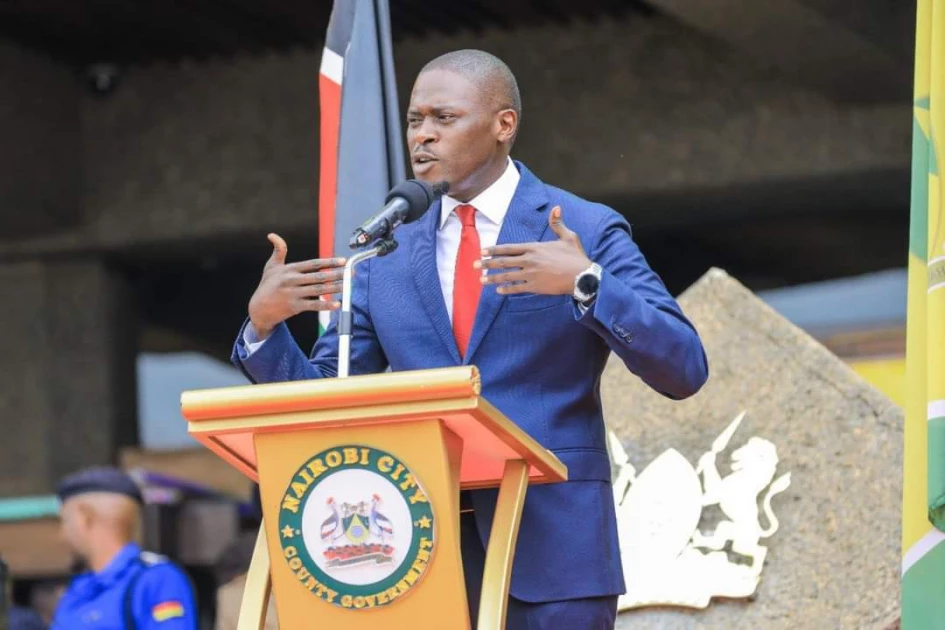Six major promises Governor Sakaja made to Nairobians

Nairobi Governor Johnson Sakaja speaks during his swearing-in at KICC. PHOTO| COURTESY

Audio By Vocalize
Nairobi Governor Johnson Sakaja
officially took the oath of office on Thursday in a ceremony full of pomp and
colour at KICC, effectively making him the capital’s new boss.
Being Nairobi’s
fourth Governor within a period of 10 years, a stand-alone case in the
nation, Sakaja has captured the attention of Kenyans as he becomes chief of the
richest county that is set to receive over Ksh.19 billion in revenue allocation.
Together
with his deputy Njoroge Muchiri, Sakaja vowed to – in his own words – ‘make Nairobi
work’ and deliver it from the shackles of corruption cartels.
His
swearing-in ceremony has now gotten Kenyans questioning his delivery tactics
and capabilities, owing to the fact that his predecessors are perceived to have
failed, with even one of them ousted leaving the administration of the city at
the hands of the Nairobi Metropolitan Service (NMS).
And so,
Citizen Digital takes a second look at Sakaja’s six-point manifesto, which he presented
to Kenyans as what he believes will be able to transform the city into a global
hub.
Dubbed
‘Let's Make Nairobi work’, the strongly-worded 32-page manifesto focuses on
four pillars of Order, Dignity, Hope and Opportunity, that have further been
narrowed down to six key agenda points of the Sakaja-Muchiri administration.
A city of
order
In his
key point, Sakaja's manifesto focuses on four main areas: providing healthy
lunches for all learners in public primary schools; decentralizing the city
into five boroughs for focused service delivery for citizens; create a working
Universal Health Care (UHC); and efficient mobility.
In regard
to pioneering a feeding programme for the 205 public primary schools with a
total enrolment of about 193,058 students across the city, Sakaja says this will
solve the low transition challenge since - according to him - about 65% of
parents from vulnerable households can afford only one meal a day.
On decentralizing
the city into five boroughs, Sakaja’s manifesto entails how he will
cluster Nairobi into North, East, West, South and Central administration blocks
to ensure ease of access to public services and management.
He outlines
that his administration will prioritise on providing quality healthcare through
implementing an Integrated Hospital Information Management System (IHIMS) and
health financing such as settling KEMSA debt to facilitate the supply of medicine.
In his
fourth plan to bring order to the capital, Sakaja and Muchiri promise to
restore decency in public transport by decongesting the CBD, constructing
footpaths, proper covered drainage and building a city metro commuter light
rail, among other related ways.
A city of
Dignity
The
former Senator seeks to deliver clean and safe water for all households,
affordable and decent housing, and clean and green Nairobi for all residents
without favour.
Sakaja’s manifesto also commits to ensuring
city dwellers are treated the same; are respected and are looked upon by the
county government with dignity and honour.
Handling
waste menace across the county, Sakaja says will be done by developing water
infrastructure by unblocking water and sewerage projects as well as addressing
the distribution of water in underserved and non-served areas.
Furthermore,
e-waste handling and disposal of waste are among the ways Sakaja hopes to
ensure the City is clean.
In
dealing with land ownership and tenancy, the Sakaja administration vows to
focus on ending demolitions without notice and the provision of alternative
settlements.
A city of
opportunity
In this
pillar which focuses on prospering residents, Sakaja says his administration
would build 20 new markets around the city to accommodate over 543 hawkers,
deliver a digital unified single business permit and implement Ksh 50 million
biashara fund per ward.
In
addition, Sakaja leadership will also see full implementation of the 30 per
cent AGPO programs.
A city of
inclusivity
The
pillar consists of catering for Persons With Disabilities (PWDs), gender
balance and dealing with the less fortunate in society, especially street
children.
Sakaja
reassures that his tenure will pilot programs of social support for children
with special needs, including the needs of women and people with disabilities
in all planning and programmes and have Gender-sensitive and other programmes.
Sports
and talents
With a
focus on providing the youth with opportunities to improve their livelihoods,
Sakaja believes that revamping sports, creative arts, and talents will be able
to provide an environment that nurtures, grows, and monetizes their talents.
Sakaja-Muchiri,
therefore, commit to initiating an annual “Sakaja” Cup tournament together with
an annual Nairobi Festival in December that will showcase the city and host an
all-sports inclusive fund and also deliver
sports centres in all sub-counties.
They also
promise to lobby for improved royalty payments to content creators and lobby
for 60% play time for local content on TVs.
A city of
hope
After
fulfilling his promises in the detailed 32-page manifesto, Sakaja and Muchiri
believe that Nairobi will inspire residents for a better future.
“Every
Kenyan wants the same thing; to go about their lives peacefully, make something
out of themselves and guarantee their children a future – HOPE,” he states.
He adds: “We must create a city of Order and Dignity, Hope and opportunity for
all in Nairobi. We can do it. We must do it. Let’s Make Nairobi Work.”


Leave a Comment